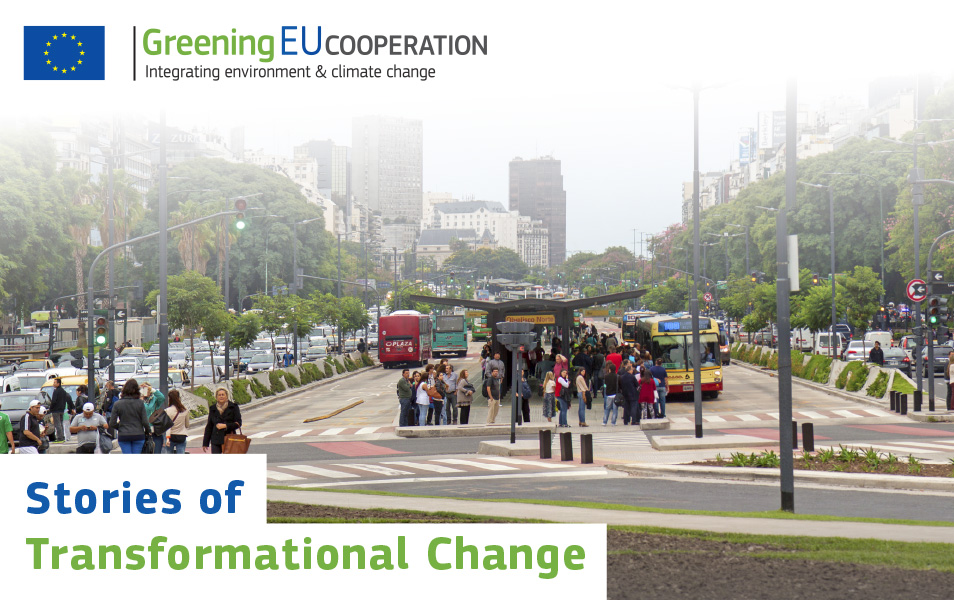Inspiring change: stories of transformational shifts towards greener development

Related topics
Environment and green economydate: 05/03/2021
Today, the European Commission Directorate-General for International Partnerships (DG INTPA) is launching a series of eight stories of transformational change that can provide inspirational examples of feasible pathways to greater environmental and climate sustainability in development cooperation.
‘These stories show large-scale changes happening in developing countries,’ said Koen Doens, Director-General for International Partnerships. ‘Although not necessarily funded by the EU, they are truly inspirational stories that can help colleagues across the world to make the case and design similar programmes and actions to help in achieving the ambitions of the Green Deal.’
 The story ‘Building with Nature: coastal protection that benefits people and nature’ is about the Indonesian initiative of building stable coastlines by integrating mangrove restoration with small scale hard-engineering, in combination with climate-smart productive land use and aquaculture best practices.
The story ‘Building with Nature: coastal protection that benefits people and nature’ is about the Indonesian initiative of building stable coastlines by integrating mangrove restoration with small scale hard-engineering, in combination with climate-smart productive land use and aquaculture best practices.
 The ‘Latin America’s Urban Transport Transformation 2.0’ story describes the success of Bus Rapid Transit (BRT) systems in Latin America, enabling the region to become a leader in active mobility infrastructure. Today, its urban transport innovation wave is providing inspiration for the transformation of large cities around the world.
The ‘Latin America’s Urban Transport Transformation 2.0’ story describes the success of Bus Rapid Transit (BRT) systems in Latin America, enabling the region to become a leader in active mobility infrastructure. Today, its urban transport innovation wave is providing inspiration for the transformation of large cities around the world.
 ‘Addressing water scarcity and community vulnerability’ shows how sand dams can provide a resilient and low-cost response to water scarcity. Sand dams increase the adaptive capacity of local communities: they provide water for domestic use, for livestock and small-scale irrigation, including horticulture, and they reduce the amount of time women and children spend fetching water.
‘Addressing water scarcity and community vulnerability’ shows how sand dams can provide a resilient and low-cost response to water scarcity. Sand dams increase the adaptive capacity of local communities: they provide water for domestic use, for livestock and small-scale irrigation, including horticulture, and they reduce the amount of time women and children spend fetching water.
 Inspired by India’s Swacch Bharat Mission, the story of ‘Promoting cultural acceptance of sanitation practices’ portrays how multi-disciplinary approaches can be a driver for massive cultural, behavioural and societal transformation.
Inspired by India’s Swacch Bharat Mission, the story of ‘Promoting cultural acceptance of sanitation practices’ portrays how multi-disciplinary approaches can be a driver for massive cultural, behavioural and societal transformation.
 ‘Addressing the wastewater challenge with low-cost solutions’ narrates the experience of countries like Uganda, Egypt and Tunisia, which have made major cost savings for utilities by encouraging the use of decentralized low-cost latrines with septic tanks or by relying on nature-based wastewater treatment.
‘Addressing the wastewater challenge with low-cost solutions’ narrates the experience of countries like Uganda, Egypt and Tunisia, which have made major cost savings for utilities by encouraging the use of decentralized low-cost latrines with septic tanks or by relying on nature-based wastewater treatment.
 'Leasehold forestry in Nepal: restoring forests and livelihoods’ is based on the successful models of ecologically sustainable forest management implemented by the Government of Nepal, which promoted forest regeneration by transferring the responsibility of forest exploitation and protection to the community. The programme specifically targeted marginalised and vulnerable households, also contributing significantly to poverty alleviation.
'Leasehold forestry in Nepal: restoring forests and livelihoods’ is based on the successful models of ecologically sustainable forest management implemented by the Government of Nepal, which promoted forest regeneration by transferring the responsibility of forest exploitation and protection to the community. The programme specifically targeted marginalised and vulnerable households, also contributing significantly to poverty alleviation.
 ‘Tackling the plastic tide’ presents the different approaches of countries around the world in trying to reduce plastic pollution, from targeting plastic production, plastic use, or the handling of the resulting waste.
‘Tackling the plastic tide’ presents the different approaches of countries around the world in trying to reduce plastic pollution, from targeting plastic production, plastic use, or the handling of the resulting waste.
 Finally, ‘Eco-schools: environmental education and sustainable development’ narrates the great transformation that the Eco-schools programme is bringing about in Africa, Asia and South America. These schools are placing students at the centre of change, by providing them with the knowledge, skills, attitudes and values for leading environmental protection and sustainable development.
Finally, ‘Eco-schools: environmental education and sustainable development’ narrates the great transformation that the Eco-schools programme is bringing about in Africa, Asia and South America. These schools are placing students at the centre of change, by providing them with the knowledge, skills, attitudes and values for leading environmental protection and sustainable development.
Enjoy reading the full set of stories and we hope they inspire you to meet today's challenges on the road to a green recovery.
For further guidance on greening EU cooperation and on how to implement the Green Deal, contact:
Environment and Climate Change Mainstreaming Facility
E: INTPA-F2-F1-MAINSTREAMING@ec.europa.eu | NEAR-GREENING-FACILITY@ec.europa.eu
